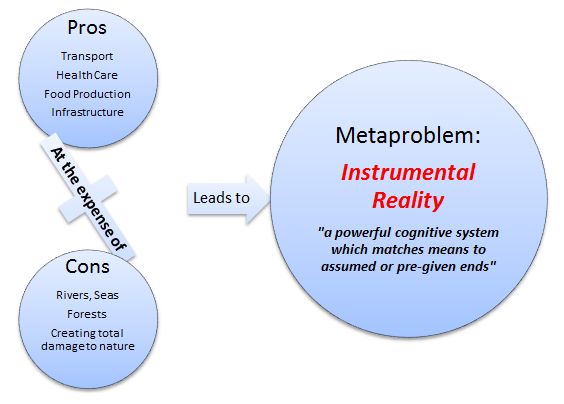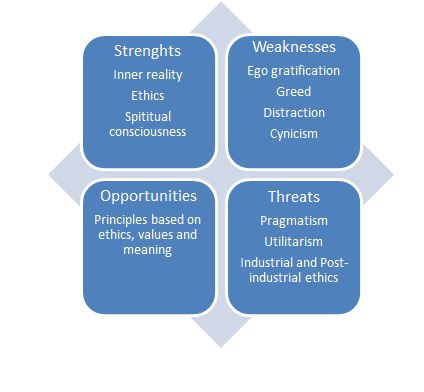If we look back at history, starting from medieval era, passing by the enlightenment till reaching the industrial revolution, which brought tremendous mutations to humanity, we will notice that each period has left marks on the way we live. For example, the latter, “the industrial culture”, according to Richard Slaughter, led societies to a shift from thinking to acting along with an entire disregard of inner reality. The result was focusing of having instead of being. Actually, the industrial age has many pros, but its cons are too risky.

The tremendous achievements have generated the issue of instrumental reality, which wrecks havoc to other facets that were overriding at a time, namely value, ethics and meaning, recognizing merely the physical and the mechanical aspect. Consequently, the world has shifted from “Having instead of Being” principles. The words having, possessing and owning have debuted to summarize the so-called personal success, which is too risky. Why?
From a marketing perspective, needs, wants and desires multiply all the time; nevertheless, the world cannot keep meeting them, simply because natural resources are finite. That is why some pundits; for instance, claim that the economic system should be built on principles which are infinite such us knowledge which becomes today’s fad. Slaughter asserts that “Being” is more secure in the sense that it emphasizes concepts such as life, awareness and consciousness. Based on what has been said so far, the elements displayed below should be re-questioned in a consistent manner:
- Economics: the need for new indicators and concepts to measure nations’ wealth
- Politics and Governance: reviewing the motives of political leaders
- Education: educational curriculums do not meet youth needs
- Commerce: marketing is very powerful but unethical
- The Media (traditional and modern): disseminate dramatic and negative emotions
The purpose of the study in hands is to foresee the future considering it as a field of scholarship, and not considering it as a prediction or forecast, but to understand alternatives as a context for choice.
After determining the problematic in a systematic way, in my booklet, I opted for an eclectic approach, namely anthropological, scientific, economic and futuristic. As a scholar, I am biased to the camp that claims that humanity is obliged to reconsider the inner reality so as to reach harmony within itself and towards society as a whole.
To address the direction in which humanity is headed, we need to deem three generic questions:
- Where are we now?
- Where do we want to be?
- How do we get there?
Several notorious scholars have been asked by the American Scientific Journal about the future of humanity and ten questions were raised as critical:
- Will we ever understand the nature of consciousness?
- Will sex become obsolescent?
- Could we one day replace all of the tissues in the human body through engineering?
- Will brain science change criminal law?
- Will we use wearable technologies to detect our emotions?
- Will gender equality be achieved in the sciences?
- Do you think we will one day be able to predict natural disasters such as earthquakes with warning times way ahead?
- Can we feed the planet without destroying it?
- Are we any closer to preventing a nuclear holocaust?
- Will the entire world one day have adequate health care?
Nonetheless, if we can ensure solutions to the aforementioned problems, can humanity reach happiness and tranquility?? One should not; however, forget that scientific discoveries and technology have amplified human knowledge, and improved the way we live. But in lieu of being thankful, human beings have exploited the newfound capabilities for egotistic ends. Thusly, our lives remained destitute of peace and tranquility. Industrial system has destroyed core humanistic principles and values, and this is resulted in pulsating godless cultures in that the advancements realized in all spheres focus solely on materialistic concepts with a total neglect of spiritual well being; hence, principles such as cynicism, greed and depression were the repercussions of this system. The upshots pursued are owing to the high engrossment of the external reality and pretermitting the world hidden within the human heart.
SWOT analysis of the state of affairs:

Nowadays, many scholars have come to the conclusion that science and technology could not lead people to true happiness. Therefore, they reckon that there is a need to reestablish and rekindle the relationship with the divine. Likewise, many scientific studies claim that the analysis of the external reality cannot yield to a thorough knowledge which strives to feed humanity’s highest potentials. From this standpoint, it becomes necessarily to join the dots altogether (external with internal) in order to get acquainted by the true destination of humanity and existence. Besides, all religions have stuck to one fundamental truth which is as follows:
“Humanity will never savor peace and happiness without taking the spiritual aspect into consideration”.
I had the opportunity once to discuss with one of the eminent scholars in future studies, Dr. Sohail Inayatullah, who believes that spirituality plays a captious role in determining our future.
To conclude, studies must now combine both realms “inner and outer”. By doing so, we can construct a better reality of the nature of human being and its relation with the universe.
References:
The Foresight Principle: Cultural Recovery in the 21st Century, Richard Slaughter.






